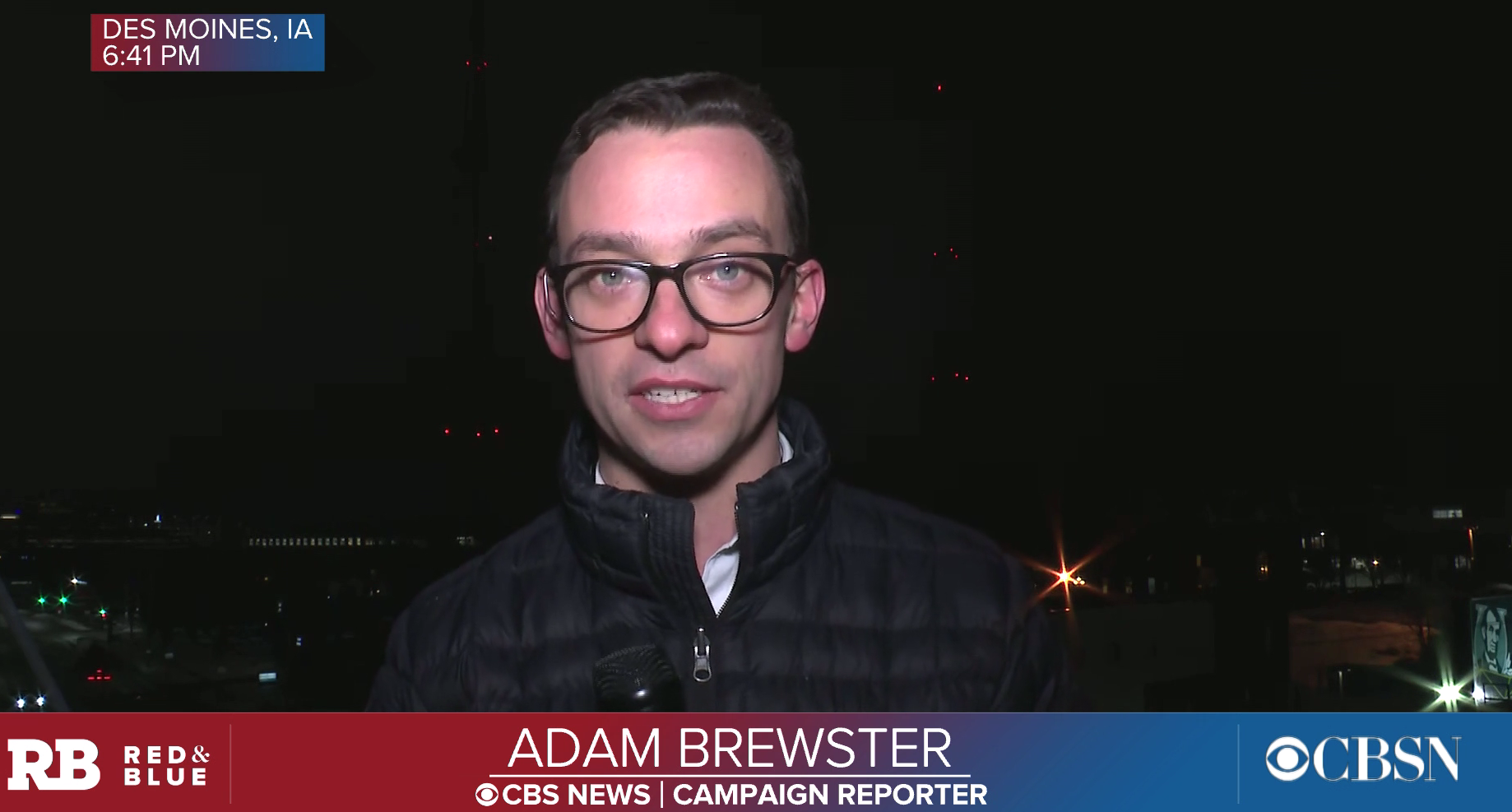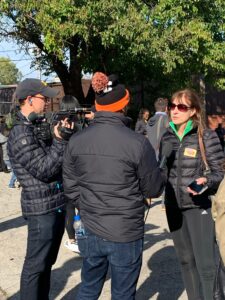Are we there yet?
The countdown to the 2020 Presidential Election is here. Nov. 3, 2020, is in our sights and the American people have deployed their lawn signs, Facebook posts, and Twitter rants. We’ve navigated the real news, “fake” news, protest marches, voter fraud, foreign interference, attack ads, conspiracy theories, and more.
Google the term “election fatigue,” and you get some 43.6 million results. But while most Americans are weary of all this politicking, Adam Brewster, BA ’12, is more energized than ever. The CBS reporter is on the campaign trail, covering the presidential candidates in the high-impact states of Iowa, Texas, Michigan, and Wisconsin. He also covered the Democratic National Convention. Though much of his work is virtual due to COVID-19, he still dons his mask and covers live events to connect with voters.
“Even after a long day, it’s hard for me to just put it away because it’s all interesting to me,” he says. “I guess it’s the natural interest I have in politics and policy and the ways things work.”
Brewster joined “CBS This Morning” in New York just as the network’s campaign reporters were leaving to embed with the 2016 presidential campaigns. He made a note to apply when the opportunity arose again. In the interim, he worked as a member of the control room editorial staff in New York and became a broadcast associate producer where he guided the direction of the 8 a.m. news block.
“Politics has always been my favorite part of news,” Brewster says. “And I didn’t want to pass up the opportunity to have the chance to cover a presidential campaign so intimately.”
Currently based in New York, Brewster spoke to Michigan Today from his parents’ home in Michigan, a temporary base to cover election activity here. As he prepared to drive to Wisconsin for an event in mid-October, his main concern was passing through Ann Arbor to grab a sandwich from Zingerman’s or Maize and Blue Deli. Below are some of Brewster’s thoughts formed on the 2020 campaign trail.
MAKING ZOOM CONNECTIONS
Our job is to listen to these candidates and give a window into who they are and what they stand for after spending an hour or two with them in a coffee shop or a gym on a Tuesday afternoon. Obviously, the campaign just looks so different now. It’s harder to meet with people and connect because the usual tools we have for that exist in a different space now.
[Reporters] have had to retool and rethink how we do things and think creatively about how to approach and tell interesting, informative stories. And the ‘scoops’ will come when they come, as long as we can keep people informed, teach them something, and help them understand something better.
ELECTION FATIGUE
I think every job has its challenges. But even when I think back to the days that were frustrating, they seem so trivial now. There’s not a single thing I would change or have done differently. It’s all been a rewarding experience. We work in a business with a lot of pressure and sometimes your equipment is not working the way you want it to. The days can be very long. I think I covered almost 20,000 miles in Iowa. But this is what [campaign reporters] love to talk about and love to read about and love to analyze.
INSTANT EXPERTISE
I’ve joked with some of my friends who are lawyers — they’ve said, “You could probably survive a 1L Civil Procedure class at this point.” I took Anthony Collins’ class on Supreme Court coverage at U-M and a couple of classes in media and law that have really helped. I had to quickly retrain my brain on legal procedure and court rulings as I was looking into things like ballot rejections and what the experts were saying about claims of fraud and absentee voting. That was an interesting thing to cover throughout the summer and gave me a really good base for understanding how this is all playing out right now. Pandemic aside, the stretch from Labor Day to Election Day is much different than the same stretch in 2019. It’s all very much in hyper-focus now.
POLITICS FOR THE PEOPLE
My first event in Iowa was at a farm with Beto O’Rourke. I was anxious, hustling to get there. I remember grabbing my camera and feeling all rattled. [O’Rourke] toured the farm speaking to the farmer, and they talked about how important it was to get farmers and ranchers more involved in environmental solutions for climate change. So I was listening to their conversation and the nitty gritty of how they hoped to make that happen – changing the way we till soil, grow crops. And it’s been remarkable since then to see how that idea has grown and flourished and is still in the dialogue. It became a plank of many politicians’ platforms and it all started with a few people having some big ideas and putting them out in their communities. Seeing how that idea began in a small setting and reached the biggest stages of American politics was really cool.
HUMAN NATURE
When most people envision a campaign event in their head, it happens in this huge space with thousands of people. But the bulk of the campaign events I went to happened in crowds of dozens, or maybe 100-150 people. The candidate talks for 25 minutes and says, “this is why you should like me, folks,” and then people ask questions. It was an interesting experience to see the momentum grow as we got closer to February. Some candidates who had 12 people at their events in July might be drawing 400-plus in January.
I’ve found most people’s decision-making just comes down to how they feel about someone, and whether they think that person has their interests at heart. That means a different thing to every single person. You hear some people talk about character, you hear other people talk about health care. Even the people who are intensely partisan on either side can explain what motivates them to vote the way they do. And it all comes down to how they think the candidate is helping or not helping them.
[Members of both parties] want the government to address the issues that are most personal to them. They want the government to make sure they can go see a doctor, that their jobs are going to be in place, that they’ll be able to put some money aside. That’s what people want the government to focus on again, no matter who you’re talking to.






